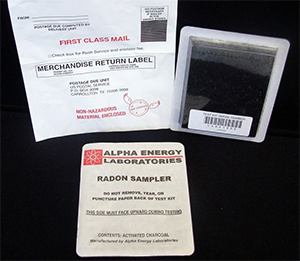Radon
 Radon is an odorless, colorless and tasteless gas produced by the decay of natural radioactive materials found in the soil. It’s a naturally occurring environmental hazard that seeps into homes and other buildings through joints or cracks in the foundation and has been found above recommended levels in as many as one in four homes in Kansas.
Radon is an odorless, colorless and tasteless gas produced by the decay of natural radioactive materials found in the soil. It’s a naturally occurring environmental hazard that seeps into homes and other buildings through joints or cracks in the foundation and has been found above recommended levels in as many as one in four homes in Kansas.
Radon is known to be the leading cause of lung cancer in non-smokers and the second leading cause of lung cancer in smokers, and testing is recommended.
Purchase a Do-It-Yourself Radon Kit
Purchase a radon kit at our Extension office, 11811 S. Sunset Drive, Suite 1500, Olathe. Office Hours: Monday - Friday, from 8:30 am - 5 pm.
Cost: $15 each
- Includes test kit, lab fee and postage to mail in the kit.
- We accept cash, check (payable to "Johnson County Extension Council") or credit card (with additional service charge).
How to use the Do-It-Yourself Radon test kit:
Following the directions provided with the test kits and detectors is important, so the results will reveal the potential for elevated concentrations in the lowest lived-in level of the home.
- Instructions - English AlphaEnergy ST Radon test kit
- Instructions - Spanish AlphaEnergy ST Radon test kit
How often should you test?
- If your results are low, consider repeating the test every five years or whenever there is a significant change in the home’s foundation, heating system or air tightness from weatherization efforts.
- If you currently have a mitigation installed, your home needs to be tested every 2 years, to make sure that it is working properly and you do not have any additional changes in your foundation to increase the radon levels in your home.
- If you do any major home modifications, then you should test after you complete that project to find out if you have radon in your home because of the structural changes in your remodel.
What if the test result is above the EPA level?
If radon is present above the recommended ceiling (4.0 pCiL/Pico Curies per liter), a confirmatory test should be conducted. If you want to know the radon concentration in other areas of your home, conduct the desired number of tests at the same time. When high results are confirmed, experts recommend consulting a radon professional for mitigation system installation.
Radon in Johnson County
- Learn more about Radon levels in Johnson County.
- Radon levels by zip code in Johnson County
Additional resources:
- Kansas Radon Hotline: 1-800-693-5343
- Kansas Certified Radon Measurement Technicians and Radon Mitigation Technicians
- Radon in Kansas
Kansas Bureau of Environmental Health
Curtis State Office Building
1000 SW Jackson, Suite 330
Topeka, Kansas 66612-1274
Phone: (785) 296-8092
1-866-865-3233
jmeinholdt@kdheks.gov
ssteen@kdheks.gov